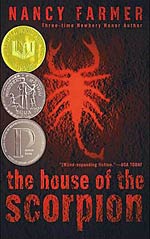
![]() gloker
gloker
4/18/2013
![]()
This engaging tale by Nancy Farmer, predicts and portrays a future with technology that includes creating and using human clones to replace aging body parts, and that has also developed specialized surgery to make free-thinking humans into robot-like workers, only capable of acting by commands. In addition, it postulates/foresees a "country" established between the US and Mexico that exclusively farms opium and other drugs.
The narrative revolves around a young boy, Matteo, who has grown up innocently and naively in the middle of this "Dreamland" (as outsiders named the nation). Matteo comes to learn that he is a clone, specially grown for El Patron (140+years old), who is not just the patriarch of the extended family; he is the autocratic ruler of this new nation. The story follows Matteo as he goes through many trials. While young, Matteo is spoiled some by El Patron (while hated by many of the other family members because clones are seen similar to livestock and shouldn't be given such gifts, provided education, or, actually, even allowed into the house). However, the "good life" comes to an abrupt end when El Patron comes to needs some of Matteo's body parts. Matteo eludes surgery, aided by the maid that raised him, a security guard with scruples, and one "cousin" who befriends him. Matteo ends up escaping "Dreamland" and is taken -seemly with benevolence- into the neighboring country's orphanage. This turns into a nightmare of both corruption and fascism.
The intended juvenile audience might be more accepting of the few plot jumps and the couple of overdrawn scenarios, but adults will mostly be well served regardless of these. The writing and context is richly set as Farmer skillfully mixes in Mexican foods, holidays, traditions, religion, and language. I found this an enjoyable and thoughtful novel. I would recommend it to sci-fi readers who desire provocative examinations of issues of current social/political hotpoints (drug war, immigration) and advancing sciences flashpoints (biomedical), but who like these shared with good storytelling.